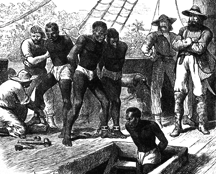 Last year Emory University in Atlanta debuted its African Origins website. The site contained a database of more than 9,000 Africans who were enslaved but later freed by the Courts of Mixed Commission in Havana, Cuba, and Freetown, Sierra Leone. Researchers took the names from ships’ registers and made recordings of the names as they were likely pronounced by officials in Havana and Freetown. They then played these recordings to linguistics experts in an effort to identify the African origins of people who were on these ships. Visitors to the site can browse through a list of names, hear how they are pronounced, and can fill out an online form if they have any information that will help researchers determine where in Africa these people originated.
Last year Emory University in Atlanta debuted its African Origins website. The site contained a database of more than 9,000 Africans who were enslaved but later freed by the Courts of Mixed Commission in Havana, Cuba, and Freetown, Sierra Leone. Researchers took the names from ships’ registers and made recordings of the names as they were likely pronounced by officials in Havana and Freetown. They then played these recordings to linguistics experts in an effort to identify the African origins of people who were on these ships. Visitors to the site can browse through a list of names, hear how they are pronounced, and can fill out an online form if they have any information that will help researchers determine where in Africa these people originated.
Now Emory has added the names of an additional 80,000 African captives who were victims of the illegal slave trade. The updated database now contains about one half of all the people rescued from illegal slave vessels in the 1808 to 1862 period.
Here is a video that explains the project.










